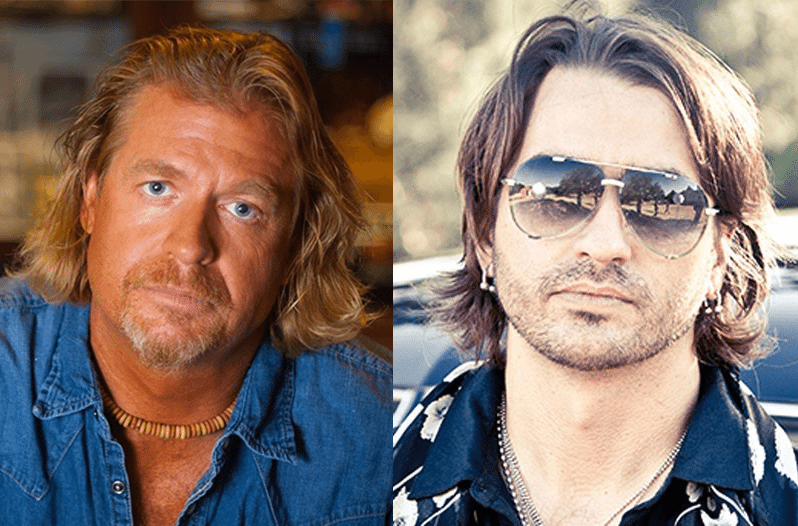[dropcap]E[/dropcap]verybody is from somewhere. For most, there's an inherent love-hate relationship with where they're from. Growing up, you can't wait to leave. As you grow older, that contempt can soften. You often look back and think of the good times.
Videos by Wide Open Country
In the late '90s, the Texas-Oklahoma music scene that we know today was in its' infancy. The infrastructure you're familiar with today, it wasn't there. A growing number of songwriters and bands, the likes of Robert Earl Keen, Jack Ingram, Pat Green, Bruce Robison, Charlie Robison, Cross Canadian Ragweed, Jason Boland & The Stragglers and Mike McClure, all had a part in laying down the foundation for Red Dirt and Texas Country. They may not have been the creators of the budding scene, but they most certainly popularized the movement.
You can never pinpoint who or what songs were the most vital component in a music scene, but Charlie Robison's "My Hometown" and Cross Canadian Ragweed's "17" come as close as any. Those two songs, essentially the flip side of one another, helped energize Red Dirt and Texas Country fans before they even realized what either genre was.
Writing a hometown anthem
In 1998, Robison released his hometown homage on his sophomore album, Life of the Party. "I was living in Austin at the time. This was the early '90s and it was starting to change," says Robison. "It was starting to get a little too hip for me. I was missing the simplicity of my hometown." It was Robison's brother, Bruce, who convinced him to record the song after hearing him play it the day he wrote it. "It's funny because I thought it was a song that was only about me," says Robison. "I didn't realize it was going to be a song so many people were going to identify with."
While Robison was longing to return to the purity of his roots in Bandera, Texas, Cody Canada's "17" was searching for a way out of the mundane bland of Yukon, Okla. "They wanted me to show cattle, show hogs, graduate, get a job and be bored for the rest of my life," says Canada. "I got kicked out of school two weeks before my senior prom. I went to Stillwater because I knew that's where music was. It was there where I really learned that music was what I was meant to do."
Years later, Canada returned to Yukon for a visit. Canada and a small group of friends were at Jeremy Plato's house. Canada, along with Jason Boland, went out for a beer run when they passed a cop in front of the high school. "I had been smoking some weed so I was little on the paranoid side," says chuckling Canada. "When I was 17, they were just looking for a reason to get me in trouble. That's when Jason said 'You're always 17 in your hometown.'"
It was on the drive back to Stillwater that Canada wrote the song. "I called Jason and told him I couldn't wait and that I needed to write it while it was hot," says Canada. "He felt the same way about his hometown. Music was a pipe dream that was never going to come true."
Laying down the foundation
It's not as though Canada or Robison invented the hometown song. There's been plenty who have written the hometown anthem. Steve Earle's "Someday," Tom Petty's "Hometown Blues," Bob Seger's "Mainstreet," and a host of others had explored the highs and lows of their old stomping grounds. Heartland rockers like Bruce Springsteen and John Mellencamp had spent the vast majority of their careers creating the lexicon for the hometown anthem.
But what made Canada's "17" and Robison's "My Hometown" special, was the fact that they weren't artists signed to lucrative record deals or from halfway across the country. The reason they resonated was because Canada and Robison were from hometowns that were very much the same as the hometowns of their growing fanbase.
Though they come at it at two very distinct angles, ultimately, Canada's "17" and Robison's "My Hometown" are about the same exact thing -- chasing down a dream. In many ways, they're almost not even about hometowns at all. They're just the device that gets you there. Canada is searching for a way to pursue music. Robison is searching for familiarity and a simpler way of living.
"I wish I could say that I was writing it as this kind of hometown song, but it just happened," says Canada."I was mad. I was ready to jump in a car and drive away as fast and far away as possible."
Robison echoes the sentiment. "I think they were both written before either of us had any success," says Robison. "They were written for ourselves first. I don't think either of us thought they'd have any impact on others. Those are the songs where you're totally honest without really knowing it."
That raw, and sometimes brutal, honesty is what people identified with most. It helped create a die-hard fanbase where most people felt written off or forgotten by the music establishment of Nashville, New York, and Los Angeles. For up and coming songwriters, they laid a template for which they could build off on.
Mutual admiration
Though they've never had a conversation about the songs, Canada and Robison are both more than familiar with the other's hometown anthem. "I definitely felt it was kind of an answer to mine," says Robison. "I've heard a million songs like that since, but I always felt they were trying to say the same thing I was. But when I heard Cody's song, I felt like it was a prequel or sequel to mine."
For Canada, "My Hometown" was even a part of his set during those early days of Ragweed. "I was chasing folks like Jack Ingram, Charlie and Robert. I was trying to learn from those guys," says Canada. "That was a tune I did every night before we had enough of our own material."
"For some reason, it's probably the one song I don't ever get tired of playing it a set," says Robison. "It's kind of grown along with me. I'm always wanting to go back to my hometown, both literally and figuratively."
"I think it all starts with the dream," Canada adds. "It's still about proving yourself outside those city limits. In my case, I've never reached the end of that journey."




